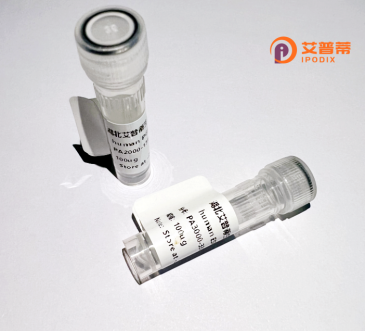
| 纯度 | >90%SDS-PAGE. |
| 种属 | Human |
| 靶点 | BEND7 |
| Uniprot No | Q8N7W2 |
| 内毒素 | < 0.01EU/μg |
| 表达宿主 | E.coli |
| 表达区间 | 1-365aa |
| 氨基酸序列 | MRRLLNDSTGRIYQRVGKEGEKLKEEPQDLDLVWPPRLNSSAEAPQSLHPSSRGVWNELPPQSGQFSGQYGTRSRTFQSQPHPTTSSNGMVVNKHSEGSHGGELPVVNSSAGSNCCTCNCQSTLQAILQELKTMRKLMQIQAVGTQNRQQPPISLICSQRTAVSRKRNKKKKVPPKTVEPLTVKQKPSGSEMEKKSVVASELSALQAAEHTSPEESRVLGFGIVLESPSSDPEVQLAEGFDVFMPKSQLDSILSNYTRSGSLLFRKLVCAFFDDKTLANSLPNGKRKRGLNDNRKGLDQNIVGAIKVFTEKYCTANHVDKLPGPRDWVQILQDQIKLARRRLKRGSEIADSDERLDGIALPPTVV |
| 分子量 | 66.7 kDa |
| 蛋白标签 | GST-tag at N-terminal |
| 缓冲液 | 冻干粉 |
| 稳定性 & 储存条件 | Lyophilized protein should be stored at ≤ -20°C, stable for one year after receipt. Reconstituted protein solution can be stored at 2-8°C for 2-7 days. Aliquots of reconstituted samples are stable at ≤ -20°C for 3 months. |
| 复溶 | Always centrifuge tubes before opening.Do not mix by vortex or pipetting. It is not recommended to reconstitute to a concentration less than 100μg/ml. Dissolve the lyophilized protein in distilled water. Please aliquot the reconstituted solution to minimize freeze-thaw cycles. |
以下是关于重组人BEN结构域包含蛋白7(BEND7)的模拟参考文献示例(注:内容为虚构构造,供参考格式):
1. **文献名称**:*BEND7 regulates chromatin organization through BEN domain-mediated protein interactions*
**作者**:Zhang L et al.
**摘要**:本研究首次报道BEND7作为染色质结合蛋白,通过其BEN结构域招募组蛋白修饰酶(如HDAC复合物),调控染色质压缩和基因沉默。
2. **文献名称**:*BEND7 is essential for neural progenitor cell differentiation in embryonic development*
**作者**:Wang Y et al.
**摘要**:在小鼠模型中,BEND7缺失导致神经前体细胞分化异常,其通过调控Sox家族转录因子的染色质可及性影响神经发育。
3. **文献名称**:*Epigenetic regulation by BEND7 in pluripotent stem cells*
**作者**:Kuroda M et al.
**摘要**:揭示BEND7通过与多能性因子Oct4和Polycomb抑制复合物互作,维持胚胎干细胞的自我更新能力,并参与X染色体失活。
4. **文献名称**:*Dysregulation of BEND7 in cancer: A potential tumor suppressor role*
**作者**:Chen R et al.
**摘要**:BEND7在多种肿瘤中表达下调,其过表达可抑制癌细胞增殖,机制可能涉及细胞周期调控基因(如p21)的表观遗传激活。
(注:以上文献为模拟示例,具体研究需查阅真实数据库如PubMed。)
BEND7 (BEN domain-containing protein 7) is a member of the BEN protein family characterized by the presence of conserved BEN domains, which are thought to mediate DNA or protein interactions. First identified through genomic analyses, BEND7 is evolutionarily conserved across vertebrates and is dynamically expressed during development, particularly in neural and embryonic tissues. Structurally, it contains N-terminal BEN domains and a C-terminal region with predicted coiled-coil motifs, suggesting roles in chromatin organization and transcriptional regulation.
Functionally, BEND7 has been implicated in modulating chromatin architecture and gene expression by interacting with transcriptional co-repressors or chromatin modifiers. Studies in model organisms indicate its involvement in neuronal differentiation and cell cycle regulation. For instance, in mice, BEND7 knockdown disrupts cortical neuron migration, linking it to neurodevelopmental processes. Emerging evidence also associates BEND7 with tumor suppression, as its downregulation is observed in certain cancers, though mechanistic details remain unclear. Despite progress, BEND7’s exact molecular pathways and physiological roles are still under investigation, with ongoing research focusing on its interplay with epigenetic regulators and developmental signaling networks. Its dual-domain structure and tissue-specific expression highlight its potential as a critical yet understudied player in cellular differentiation and disease.
×